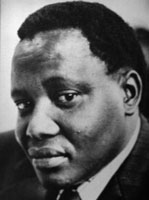This Day in History: January 22, 1981
Additional Date: January 22, 1981
Percy Qoboza was a journalist and outspoken critic of the apartheid regime. He initially studied in the field of theology, but became involved in journalism after joining the staff of the World in 1963. By 1974 he had become the editor, and ensured that the World was the most circulated Black newspaper in the country.
After studying in the United States for a year, Qoboza returned to South Africa with even greater determination to challenge the apartheid system. Re-assuming his role as editor of the World, he showed open support for the Soweto Uprising in 1976. As a result of this, the newspaper was banned and Qoboza was detained without a charge until March 1978. International pressure led to his release, and he became the editor of the Post. In 1980, however, the newspaper was forced to close down. Attempts to have it re-established were thwarted by the government. Qoboza then left for the United States, stating on 22 January 1981 that it would be difficult to create and sustain a credible newspaper for Black readers in South Africa, given the constant black media persecution under the apartheid regime.
Qoboza served as a guest editor of the Washington Post for two years, thereafter returning to South Africa to work at the editor of the City Press. He has been heralded as one of the most influential newspaper editors in South Africa and has received numerous awards, including the Golden Pen of Freedom.
